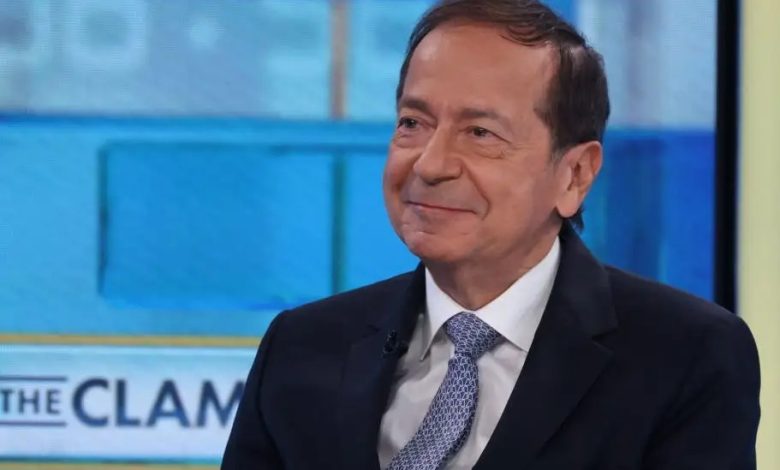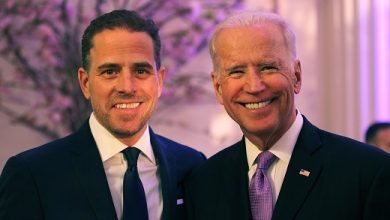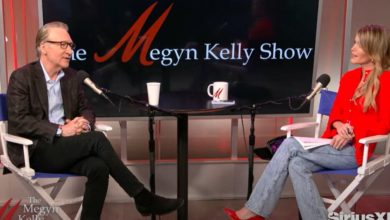Billionaire stock market visionary John Paulson reveals SHOCK financial move he’ll make if Kamala wins the election

A billionaire stock market visionary has revealed the shocking financial move he would make if Vice President Kamala Harris were to win the presidential election.
John Paulson, known for his lucrative bet against subprime mortgages in 2007, said on Tuesday that he would pull all his assets out of the stock market if the Democrat nominee wins.
‘I think if Harris were elected, I would pull my money from the market.
I’d go into cash and I’d go into gold because I think the uncertainty regarding the plans they outlined would create a lot of uncertainty in the markets and likely lower markets.’
John Paulson: I’d go into cash and gold if Kamala Harris is elected @FoxBusiness https://t.co/g2u6J9WCb8
— Liz Claman (@LizClaman) September 17, 2024
The founder of Paulson & Co. whose estimated net worth is $3.8 billion went on to describe how he thinks Harris’ tax policies would scare investors, resulting in a ‘pretty quick recession.’
Paulson explained to Fox Business host Liz Claman that Trump’s and Harris’ economic plans are very different, noting that the former president wants to extend his 2017 tax cuts while Harris wants to let them expire.
‘The Trump policies came out better for the average American,’ argued the investor – a major Trump donor who is being floated as a potential Treasury secretary.
During the Trump administration, average real wages increased by six and a half percent, Paulson said.
He also noted that Harris has proposed raising the corporate tax rate from 21 percent to 28 percent, and wants to raise the capital gains rate from 20 percent to 28 percent.
She has also proposed a 25 percent tax on unrealized gains for individuals making $100 million or more – creating a severe dent in the profits of major investors.
If the 25 percent tax increase were implemented, Paulson said, it ‘would cause mass selling of almost everything – stocks, bonds, homes art.
‘I think it would result in a crash in the markets and an immediate, pretty quick recession,’ Paulson warned.
Claman, though, pointed out that some people who were concerned about former President Barack Obama’s economic policies pulled their money out of the market when he was elected – which backfired when stocks continued to perform well.
Paulson then said market timing and investor timing would make the difference in the markets if Harris were elected.
But still, he said, he is not willing to take the chance and would sell off his stocks.
A global stock market crash in August after fears the US ecomomy was slowing wiped bilions of dollars off the value of companies – and hammered Americans’ 401(K)s.
But it has more than recovered since then over hopes the US will avoid a recession.
Not everyone agrees. Paulson’s remarks come just days after JPMorgan Chase CEO Jamie Dimon said he would not rule out an outcome for the US economy which is widely considered to be worse than a recession.
The chief executive of the country’s biggest bank said this week ‘the worst income is stagflation,’ which he would not ‘take off the table.’
Economists widely consider stagflation, last seen in the US in the 1970s, to be worse than a recession. It would send stocks down, hitting 401(K)s and other retirement savings.
Stagflation is the combination of economic stag-nation and in-flation. Prices continue to soar at the same time as unemployment rises and economic growth slows – a triple whammy of problems.
In a recession, unemployment increases and the economy shrinks – but the silver lining is that there is little or no inflation.
Dimon says he worries that there are still a raft of inflationary forces on the horizon, and pointed out that higher deficits and increased government spending will add pressure to an economy still reeling from the impact of sustained higher interest rates.
The JPMorgan Chase CEO has previously warned of an economic slowdown, saying that he would also not rule out a ‘hard landing’ for the US economy.
A ‘hard landing’ is when there is a marked economic slowdown following a period of rapid growth.
Other economists have predicted that the US is on track to stick a ‘soft landing’ – which has only happened once before.
This rare slowdown is when the rate of inflation returns to the Fed’s 2 percent target without triggering a recession.
Dimon, however, said in August that he thinks the odds of this happening are around 35 percent to 40 percent, CNBC reported, implying a recession is the more likely outcome.
Economic news on Wednesday will move the markets – when the Federal Reserve will cut interest rates for the first time in four years.
A fall in the rate of inflation last week has paved the way for a bigger cut of 0.5 percentage points rather than 0.25. Such a move would likely boost share prices for now.
The JPMorgan Chase CEO has previously warned of an economic slowdown, saying that he would also not rule out a ‘hard landing’ for the US economy.
A ‘hard landing’ is when there is a marked economic slowdown following a period of rapid growth.
Other economists have predicted that the US is on track to stick a ‘soft landing’ – which has only happened once before.
This rare slowdown is when the rate of inflation returns to the Fed’s 2 percent target without triggering a recession.
Dimon, however, said in August that he thinks the odds of this happening are around 35 percent to 40 percent, CNBC reported, implying a recession is the more likely outcome.
We’re talking presidential policies with Paulson & Co. Founder John Paulson, who offers predictions on the impact of both the Harris and Trump campaigns’ tax plans. pic.twitter.com/hqJoRQocEw
— Money Movers (@moneymoverscnbc) September 13, 2024
Economic news on Wednesday will move the markets – when the Federal Reserve will cut interest rates for the first time in four years.
A fall in the rate of inflation last week has paved the way for a bigger cut of 0.5 percentage points rather than 0.25. Such a move would likely boost share prices for now.
Yet Goldman Sachs has offered a different opinion, suggesting Harris would be better for the economy if she triumphs over Trump.
A Democrat win would deliver around 30,000 more jobs a month than under a Republican sweep, new analysis from the bank states.
The Wall Street giant also believes that Harris’ plans to help middle class Americans and small businesses would increase consumer spending, benefitting the wider economy.
That boost would outweigh any negative impact of potential higher taxes on the wealthy and big business, according to the report.
‘A Harris presidency could benefit small and medium businesses as the focus would appear to be on fiscal policies that provide support through tax incentives and grants for startups,’ Javier Molina, senior market analyst at eToro.
Harris is also ‘expected to lead to higher job creation when compared to Trump, especially if accompanied by fiscal stimulus and expanded tax credits. This could lead to moderate job growth, boosting sectors like renewable energy and infrastructure,’ Molina explained.
By contrast, if Trump wins inflation would rise and economic output would take a hit in 2025, Goldman Sachs report argues.
The hit would be a result of much tighter immigration policies that Trump has advocated for, and from increased tariff on imports which the former president has threatened.
‘We estimate that if Trump wins in a sweep or with divided government, the hit to growth from tariffs and tighter immigration policy would outweigh the positive fiscal impulse,’ the bank’s report read.
Increased tariff on goods such as electric cars from China, Mexico and the EU would push core inflation higher, the banks said.
Immigration is widely considered among economists to be a driver for growth as immigrants tend to be younger, boost the labor market and spending.
Goldman argues that curbing immigration in the ways Trump plans to would remove those growth engines, damaging the country’s bottom line.


